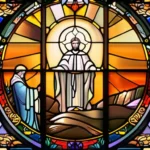Explore the role, beliefs, and practices of Islam in shaping religious thought across history.
Delve into the profound impact that Islamic faith has had on religious thought throughout history. From its origins to modern times, we will examine the core principles, beliefs, and practices that have shaped the Islamic worldview and influenced other religions.
The Origins of Islam: A Brief Overview
The origins of Islam can be traced back to the early 7th century CE, with its founder being Prophet Muhammad. Imagine you are sitting around a campfire in the deserts of Arabia, listening to stories that have been passed down through generations—stories filled with tales of prophets and revelations. It was here that Muhammad began his journey as a religious leader, initially preaching to small groups before his message gained wider acceptance.
Initially, Muhammad faced significant opposition from the tribes of Mecca, who were deeply entrenched in their polytheistic practices and trade-based economy. The early converts to Islam were often marginalized or persecuted for their beliefs, creating an atmosphere of tension and conflict. It was during this period that Muhammad received his first revelations from Allah, as recorded in the Quran.
The transformation of Mecca under Islamic influence is a remarkable example of how religious thought can reshape society. The city, once a hub of commercial activity and idol worship, began to see a shift towards monotheism and ethical living. This transition wasn’t just about changing beliefs but also about redefining social structures and behaviors.
The early history of Islam is filled with stories of resilience and change—stories that highlight the profound impact of Prophet Muhammad and his followers. From small beginnings in Mecca, Islam spread rapidly across the Arabian Peninsula and beyond, influencing not just religious thought but also politics, law, and culture.
As we delve deeper into the core beliefs and practices of Islam in the next chapter, remember that these roots—planted in the sands of Arabia—are what nourished a faith that continues to shape the world today. How did this desert-born religion manage to spread so far and wide? What exactly was it about Muhammad’s message that resonated with people from different backgrounds?
Core Beliefs and Practices in Islam
Delving into the core beliefs and practices of Islam opens up a vast and intricate landscape that has profoundly influenced religious thought across history. Imagine, for instance, walking through a garden where every path leads back to The Five Pillars. These fundamental principles serve as the sturdy framework upon which the entire edifice of Islamic practice is built.
Firstly, the declaration of faith, or Shahada, is like planting the seed in a fertile soil. It encapsulates the belief in one God and Muhammad as His prophet. This simple yet profound statement, ‘There is no god but Allah, and Muhammad is the messenger of Allah,’ sets the foundation for every other practice that follows.
Prayer, or Salat, is like a daily conversation with a friend who never tires of listening. It involves performing five prayers each day at specific times: dawn, noon, mid-afternoon, sunset, and nightfall. These prayers not only maintain a direct line to the divine but also create a routine that helps align one’s life with God’s will.
Fasting during Ramadan is another pillar that requires abstaining from food and drink from dawn till sunset for a month. It can be likened to a spiritual detox, where individuals cleanse their bodies and minds, reflecting on the purpose of existence and the blessings they often take for granted.
Charity, or Zakat, is like pouring water into a dry well; it ensures that wealth circulates among the community. This obligatory charity not only benefits the poor but also purifies one’s wealth, ensuring that no surplus remains untaxed by God’s benevolence.
Lastly, the pilgrimage to Mecca, or Hajj, is a journey that unites Muslims from across the globe in a shared experience. It symbolizes unity and equality before God, where all pilgrims wear simple garments that strip away distinctions of class and wealth.
These pillars are not just rituals but a way of life that infuses every moment with meaning and purpose. As one delves deeper into these practices, they begin to understand how each step contributes to the larger tapestry of Islamic belief and practice, shaping the soul and guiding the spirit towards a closer relationship with Allah.
Islamic Theology: Key Concepts and Debates
The Influence of Islamic Faith on Religious Thought: A Comprehensive Analysis
Imagine religion as a vast ocean, and within it lies a pearl that shines brightly – this is Islam. The concept of tawhid, or the belief in one God, has been likened to a lighthouse guiding ships through turbulent seas of doubt. This core principle challenges not just other monotheistic faiths but also polytheistic beliefs by asserting the singular sovereignty and indivisibility of God’s existence. How did this idea shape the theological landscape across history? It was like planting a seed in the fertile ground of human thought, which has since grown into an expansive tree of knowledge and belief.
Iman, or faith, is not merely a private affair but a public declaration. Think of it as a cornerstone upon which the entire structure of Islamic practice and belief rests. The Five Pillars encapsulate this idea beautifully, each one reinforcing the other in a symphony of devotion. But what happens when we delve deeper into the specifics? For instance, how do the differing interpretations of Iman among various schools of thought influence religious discourse?
The concept of akhira, or the afterlife, adds another layer to this complex tapestry. It’s as if every moment in this life is a rehearsal for the grand performance that awaits beyond death. The debates surrounding predestination and free will, which often arise from this belief, mirror those found within Christianity and Judaism. How do these discussions shape individual spiritual journeys? And how might they influence broader societal values?
Historical debates within Islamic theology are as vibrant and varied as the sands of the Arabian Desert. From the question of ijma, or consensus among scholars, to the differing views on naskh, or abrogation – these ongoing discussions highlight the dynamic nature of religious thought in Islam. Are we not all seekers navigating through these debates, trying to find our own path while respecting those of others?
In exploring these key concepts and debates, we uncover a rich tapestry of ideas that continue to influence religious thought today. The journey from simple beliefs to complex theological arguments is akin to tracing the threads of a hand-knitted shawl, each one unique yet interwoven into a cohesive whole.
Islam’s Influence on Other Religions
The influence of Islamic faith on other religions, particularly Christianity and Judaism, has been profound and multifaceted. How many times have you pondered about the intricate web of historical interactions that shaped these relationships? The shared beliefs in monotheism, the concept of prophets, and the belief in an afterlife are like threads woven into the fabric of religious thought. Could it be that the influence of Islam on Christianity is more than just a passing glance or a superficial touch?
One cannot talk about the influence of Islamic faith without delving into the lives of key figures who bridged these religions. Think of Moses, Abraham, and Jesus as characters in an epic tale where the lines between religious identities are not always clear-cut. The Qur’an itself speaks of these prophets with great respect, often referring to them by their Arabic names. Is it not intriguing how the Islamic narrative sees these figures as part of a continuous divine message?
The practice of Hajj, or pilgrimage to Mecca, has also served as a unifying factor for Muslims and non-Muslims alike. Imagine the vast crowds, diverse in culture yet united by their intent to perform this sacred duty. The rituals of Hajj mirror many of those found in other religious traditions, such as circling the Kaaba (as in walking around the Temple Mount) or standing vigil at the plain of Arafat (akin to standing before God). How does this shared experience foster a sense of community beyond just religious boundaries?
The influence extends further through theological discussions and historical exchanges. The works of Islamic scholars like Al-Ghazali and Ibn Rushd have significantly impacted Christian philosophy, with their ideas on ethics and theology shaping the Western intellectual landscape. Is it possible that these contributions were merely coincidental or do they reflect a deeper connection in the quest for understanding?
The influence of Islam on other religions is not just about borrowing; it’s about mutual enrichment. It’s like planting seeds of faith in fertile ground, where they grow into a vibrant tapestry of shared beliefs and practices. As we explore this rich history, one can’t help but wonder: how much more could we learn if we embraced these cross-pollinations of religious thought?
The Role of Islamic Scholarship in Religious Thought
The Role of Islamic Scholarship in Religious Thought
Have you ever pondered how much Islamic scholarship has influenced the intellectual landscape of history? From philosophy to science and law, the contributions of Islamic scholars have been nothing short of transformative. Imagine a vast library filled with the works of giants like Al-Ghazali, Ibn Rushd (Averroes), and Avicenna—figures whose ideas still resonate today.
Islamic scholarship was not just about preserving ancient knowledge; it also involved critical thinking and innovation. Think of Ibn Sina (Avicenna) as the gatekeeper of wisdom, synthesizing Greek philosophy with Islamic theology in his monumental works like ‘The Canon of Medicine.’ This blending of thought created a unique intellectual environment that attracted scholars from across the globe.
In the realm of science, Islamic contributions were pivotal. The House of Wisdom in Baghdad was more than just a library; it was a crucible where knowledge from Persia, India, Greece, and Rome intertwined to foster groundbreaking discoveries. From astronomy to botany, these scholars laid the groundwork for modern scientific inquiry.
Laws and ethics also evolved under Islamic scholarship. The Fatawa (legal opinions) of scholars like Al-Mawardi offered a framework for governance that emphasized justice and fairness. These principles not only guided Muslim societies but influenced legal systems worldwide, even in areas far removed from the Middle East.
The impact of Islamic thought on religious dialogue is profound. Through works like Al-Isharat by Avicenna, scholars navigated complex theological questions, opening pathways for interfaith understanding and respect. The metaphors we use to describe logical reasoning and ethical debate can trace their roots back to these luminaries.
In essence, the role of Islamic scholarship in religious thought is not just about preserving traditions; it’s about forging a path forward where wisdom, ethics, and knowledge intertwine. As we continue to grapple with the challenges of our time, the legacy of this scholarship remains a beacon, illuminating the way forward.
Islam Today: A Global Perspective
Today, Islam is a global phenomenon, with millions of followers across diverse landscapes and cultures. It’s fascinating to ponder how this ancient faith continues to shape contemporary religious thought in such varied contexts. How does one religion resonate so strongly in places as far apart as Indonesia and Morocco?
The diversity within Islam itself adds layers of complexity. From the strict Wahhabi practices of Saudi Arabia to the more liberal interpretations seen in Turkey, each region has its unique take on Islamic faith. This variety can sometimes lead to conflicts but also fosters rich dialogue and mutual understanding among Muslims worldwide.
A key challenge facing Islam today is how it adapts to modernity. As societies evolve, so too must religious beliefs and practices. Questions arise: How should Islamic scholars engage with scientific advancements? Can traditional interpretations of the Quran be reconciled with contemporary ethical dilemmas?
The future prospects for Islam depend on its ability to navigate these challenges. Will it become more inclusive, or will it harden into exclusive doctrines? The global community watches closely, hoping that Islam can find a balance between tradition and innovation.
In essence, the current state of Islam is a dynamic interplay between past traditions and modern realities. It’s a journey marked by struggles and progress, much like a ship navigating through turbulent waters to reach its destination. How will this faith continue to shape religious thought in the coming years? The world waits with bated breath.
Conclusion
 Gain a deeper understanding of how Islamic faith continues to shape religious thought today and explore its potential future impact on global spirituality.
Gain a deeper understanding of how Islamic faith continues to shape religious thought today and explore its potential future impact on global spirituality.











